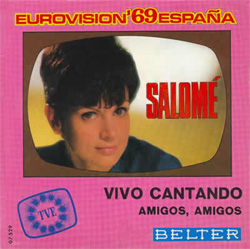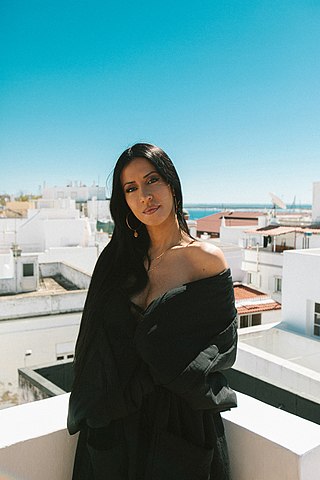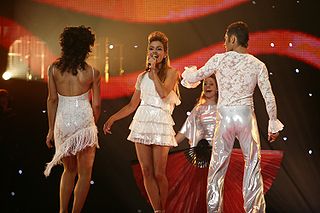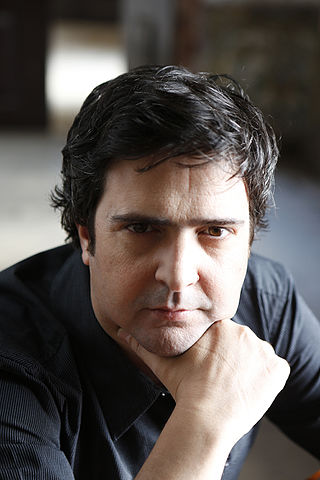
Portuguese music includes many different styles and genres, as a result of its history. These can be broadly divided into classical music, traditional/folk music and popular music and all of them have produced internationally successful acts, with the country seeing a recent expansion in musical styles, especially in popular music.

Marisa dos Reis Nunes, known professionally as Mariza, is a Portuguese fado singer.

Dulce José Silva Pontes is a Portuguese songwriter and singer who performs in many musical styles, including pop, folk, and classical music. She is usually defined as a world music artist. Her songs contributed to the 1990s revival of Portuguese urban folk music called fado.

María de los Ángeles Felisa Santamaría Espinosa, known professionally as Massiel, is a Spanish pop and protest singer. She won the Eurovision Song Contest 1968 with the song "La, la, la", being the first performer from Spain to ever win the contest.
Susana Maria Alfonso de Aguiar, known mononymously as Mísia, was a Portuguese fado singer. She was a polyglot, singing some of her songs in Spanish, French, Catalan, English, and Japanese.

Vitorino Salomé Vieira, commonly known simply as Vitorino, is a Portuguese singer-songwriter. His music combines the traditional music of his native region of Alentejo and urban popular song.

"La, la, la" is a 1968 song recorded by Spanish singer Massiel, written by Manuel de la Calva and Ramón Arcusa –the members of Dúo Dinámico–. It represented Spain in the Eurovision Song Contest 1968 held in London, being the first song from Spain to ever win the contest.

"Vivo cantando" is a song recorded by Spanish singer Salomé with music composed by María José de Ceratto and lyrics written by Aniano Alcalde. It represented Spain in the Eurovision Song Contest 1969 held in Madrid, and became one of the four joint winning songs and the second song from Spain –and last to date– to win.

Ana Cláudia Moura Pereira, known as Ana Moura, is a Portuguese fado singer. An internationally recognized singer, she was the youngest fadista to be nominated for a Dutch Edison Award.

Maria Manuela de Oliveira Moreira Bravo, known as Manuela Bravo is a Portuguese singer.

Maria Teresa Villa-Lobos, known professionally as Sabrina, is a Portuguese singer from Setúbal. She represented her country and national broadcaster RTP at the Eurovision Song Contest 2007, in Helsinki, Finland, after winning the Festival da Canção, the national selection. Due to Portugal's non-qualification to the final, in 2006, Sabrina performed in the semi-final, finishing 11th thus failing to qualify.

Katia Guerreiro is a South African-born Portuguese fado singer, who has released eight albums and has received several awards, including Order of Arts and Letters, Chevalier rank, from the French government and the Order of Prince Henry from the President of Portugal.

Anabela Braz Pires is a Portuguese singer and musical theatre actress, best known in Portugal by her first name, Anabela.

Tonicha is a Portuguese pop-folk singer. She represented Portugal in the Eurovision Song Contest 1971, with the song "Menina do alto da serra" ; she finished ninth. She also represented her country in the OTI Festival 1972 in which she had better luck and finished sixth.

Sara Alexandra Lima Tavares was a Portuguese singer, composer, guitarist and percussionist. She was born and raised in Lisbon, Portugal. Second-generation Portuguese of Cape Verdean descent, she composed African-, Portuguese- and North American-influenced world music.

Hélder António Moutinho Paiva dos Santos, artistically known as Helder Moutinho is a Portuguese singer and songwriter, and one of the most distinguished artists in the Fado genre. He's also the brother of two renowned Fado singers, Camané and Pedro Moutinho.

Pedro Jóia is a Portuguese guitarist, composer, and musical director. He is considered one of the top Portuguese guitar players.

Júlio Resende is a Portuguese pianist and composer. He is a pioneer of a unique and new genre called "Fado-Jazz". His improvisation techniques are transversal to his aesthetics, and articulate different musical genres, from Jazz, Fado, Classical Music and even Electronic Music.
The Voice Kids is the junior version of The Voice Portugal, broadcast on RTP1, with competitors between the ages of seven and fifteen. The first season premiered in 2014, and the show did not come back for a second season until 2021. In April 2019, RTP1 announced a reboot of the show, which was set to premiere in 2020, but ended up being postponed due to the COVID-19 restrictions.

Claudino Jesus Borges Pereira, better known by his stage name Dino D'Santiago, is a Portuguese activist, composer, and musician of Cape Verdean descent. First appearing in Operação Triunfo, he has released several albums, both with groups such as Expensive Soul and his project Nu Soul Family, as well as solo projects. He has won various awards from organizations such as Cabo Verde Music Awards and the MTV Europe Music Awards. He has also been featured on magazines such as GQ and the Rolling Stone.



















